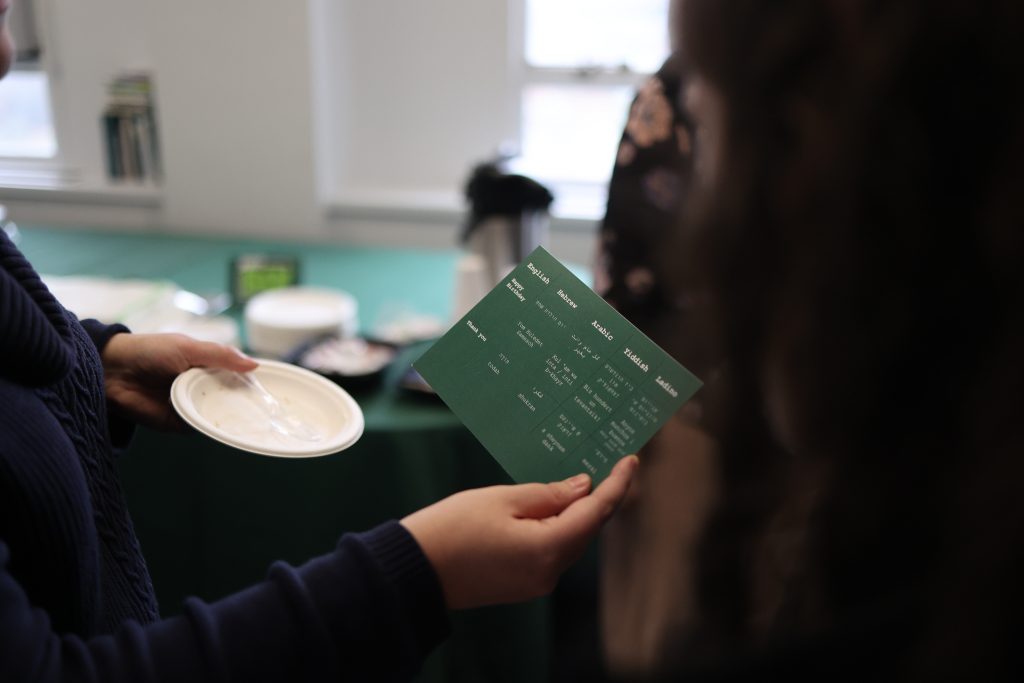On Nov. 10, Binghamton University’s Judaic studies department commemorated its 50th anniversary.
Held on the Judaic studies floor in the Bartle Library Tower, the event was held in the department’s conference room and was attended by both professors and students. It included a speech from Allan Arkush — a professor of Judaic Studies who has been associated with the department since its inception — a cake and a card explaining how to say “happy birthday” in Hebrew, Arabic, Ladino and Yiddish. The event marked a major department milestone.
C. Beth Burch, a professor of Judaic studies and the chair of the department, said that recent events had shifted the tenor of the event.
“Because of the solemnity and occasional discord of recent events, we are deliberately keeping the event low-key, observing and appreciating rather than celebrating the fact that we do have a Judaic studies department on campus,” Burch wrote in an email.
First founded in 1973, the Judaic Studies program evolved into an established department in 1991 following efforts from multiple faculty members. Its academic range covers topics ranging from American Jewish history to Hebrew and Yiddish, Israel studies and religious studies.
In his speech, Arkush gave an overview of the department’s history during his time. He spoke to the important scholarly literature and books that have come out of the University’s Judaic studies department, including “The Ministry of Special Cases,” a novel by Nathan Englander ’91, Litt.D. ’17. He also mentioned “Jewish High Society in Old Regime Berlin” by Deborah Hertz, Lance Sussman’s “Isaac Leeser and the Making of American Judaism” and “The Jews of Arab Lands in Modern Times” by Norman Stillman. He stressed that both non-Jewish and Jewish students take the department’s classes and mentioned multiple notable alumni.
Arkush expanded on the department’s ability to focus on academic study.
“Some of the work that we do here transcends political struggles,” Arkush said. “So much of our teaching has served as a means for preparing people for grappling with these issues in an honest and objective way. Our ability to stay apart from the fray is highly valuable.”
When it was initially founded, the core faculty of the Judaic studies department included Samuel Morrell, who taught rabbinical and modern Hebrew literature in the Classical and Near Eastern studies department along with three new hires — Stanley Isser, who later became the coordinator of the program, Yedida Kalfon Stillman, who taught Hebrew language courses and Norman Stillman, a Jewish history and Arabic instructor.
Natanya Ruben, a junior majoring in Judaic studies, spoke highly of the department’s course offerings.
“I find the classes to be extremely interesting in the Judaic studies department,” Ruben wrote. ”Being able to deep-dive into topics within Judaic studies that I never learned before is so cool and gives me a broader knowledge of Judaism itself. As for the professors, I feel as though I am able to form a relationship with each of them, given the size of the department and the amount of Judaic studies majors there are. They all care very much for the topics they teach as well as the engagement of the students.”
Michal Levine, a junior majoring in Judaic studies, took the time she spent at the event to engage in conversation with faculty members.
“It was a great opportunity to speak to my professors from this semester outside of the classroom, see old professors and meet potential future professors within the department,” Levine wrote.



